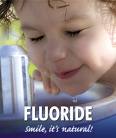 Cavity-preventing fluoride would be added to New Jersey’s public water supply under a bill that passed the Senate’s health committee yesterday over the objections of environmental advocates, utility companies and some parents. But the future prospects of the “New Jersey Public Water Supply Fluoridation Act” are in doubt. A spokesman for Assemblywoman Nellie Pou (D-Passaic), chairwoman of the Assembly Appropriations Committee, confirmed she would not hold a hearing on the bill, which has stalled since the Assembly Health Committee approved it in February and sent it to her committee for consideration.
Cavity-preventing fluoride would be added to New Jersey’s public water supply under a bill that passed the Senate’s health committee yesterday over the objections of environmental advocates, utility companies and some parents. But the future prospects of the “New Jersey Public Water Supply Fluoridation Act” are in doubt. A spokesman for Assemblywoman Nellie Pou (D-Passaic), chairwoman of the Assembly Appropriations Committee, confirmed she would not hold a hearing on the bill, which has stalled since the Assembly Health Committee approved it in February and sent it to her committee for consideration.
“Assemblywoman Pou currently does not plan to post the bill because of the potential cost to the consumer,’’ said Tom Hester Jr., Pou’s spokesman from the Assembly Majority Office.
But the Senate Health, Human Services and Senior Citizens Committee pushed ahead, voting 6-0 with three abstentions to approve the bill affecting more than 6 million New Jersey households.
Sen. Joseph Vitale, (D-Middlesex), a sponsor of the bill and the health committee chairman today said he would meet with Pou.
“I am looking forward to discussing the issue with Assemblywoman Pou to illustrate the overwhelming public health benefit and health care cost savings,’’ Vitale said.
The legislation (A3709/S2856) would require public and private water utilities to start adding fluoride within a year of the law’s enactment.
Jim Schulz of the New Jersey Dental Association chastised the state for ranking 49th in the nation for fluoridating the public water supply, depriving children of a critical health benefit, and urged the bill’s passage.
“Oral health disease is the number one childhood disease in America. It is five times more prevalent that asthma and seven times more prevalent than hay fever,’’ Schulz said.
Karen Alexander, president and CEO of the New Jersey Utilities Authority, called that time frame “unworkable.” Alexander estimated it would take between two to four years before a utility could plan, build and train workers to operate the new system.
Dave Pringle of the New Jersey Environmental Federation said he would rather let municipalities continue to decide whether to fluoridate the drinking water supply, as opposed to denying the public “informed consent” about ingesting what can be a harmful additive if the dose is too high.
About 1.7 million people in New Jersey, predominately from Mercer, Middlesex, Monmouth, Somerset and Union counties, live in communities that fluoridate the public water supply. Star Ledger.

Will that effect the kashrus of the water? And how about peseach?
This is the most monstrously conceived and dangerous Communist plot we have ever had to face.
There is a reason dentists in NJ are dealing with significantly more cavities in children than in NY, and that would be rectified if the water was fluorodated.
this would actually save me $15 a month that i spend on fluoride vitamins for my toddler
And it would cost others $$ each month who for whatever reason are anot able to drink flouridated water. For them, it’s tantamount to poisening the water supply and spending tax $$ to do it!
flouride is one of the most toxic substances and is very dangerous.
it was first used in Germany in the 1930s.
do research on it.
to # 4. check out the nosh aisles in all our stores
My chiropractor says: if you use fluoride you may keep your teeth til 120 but at some (early) age you will not longer know what you are eating….